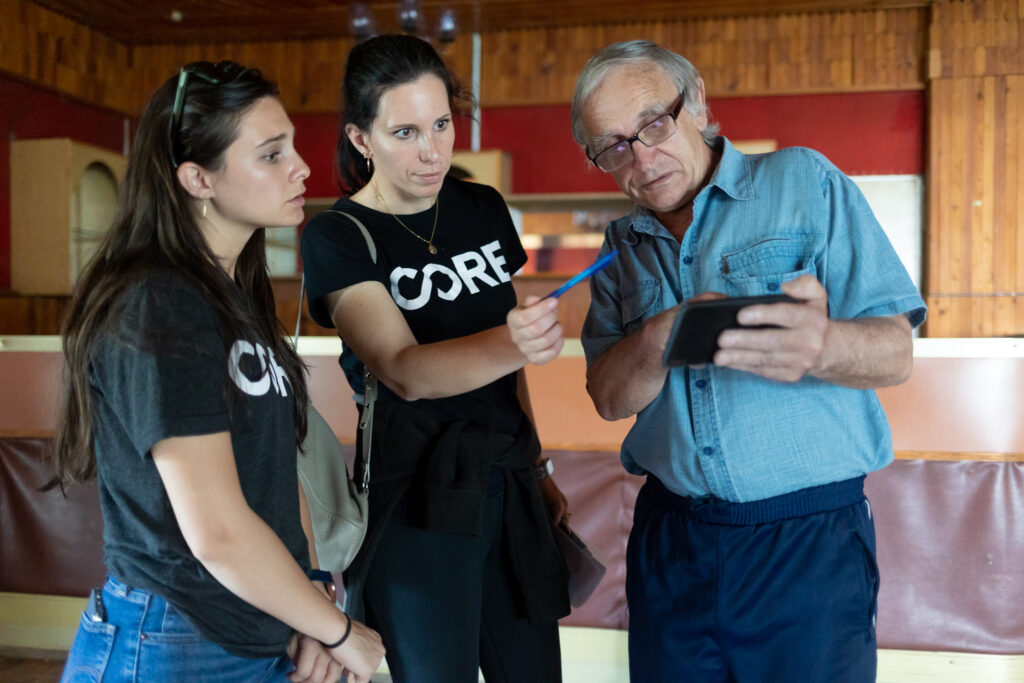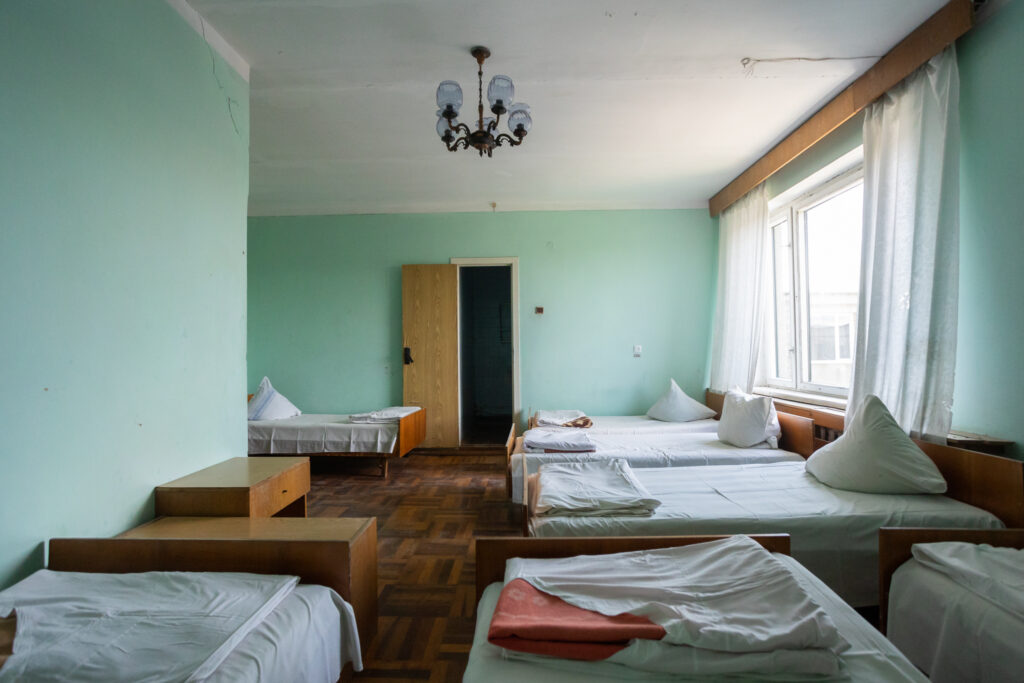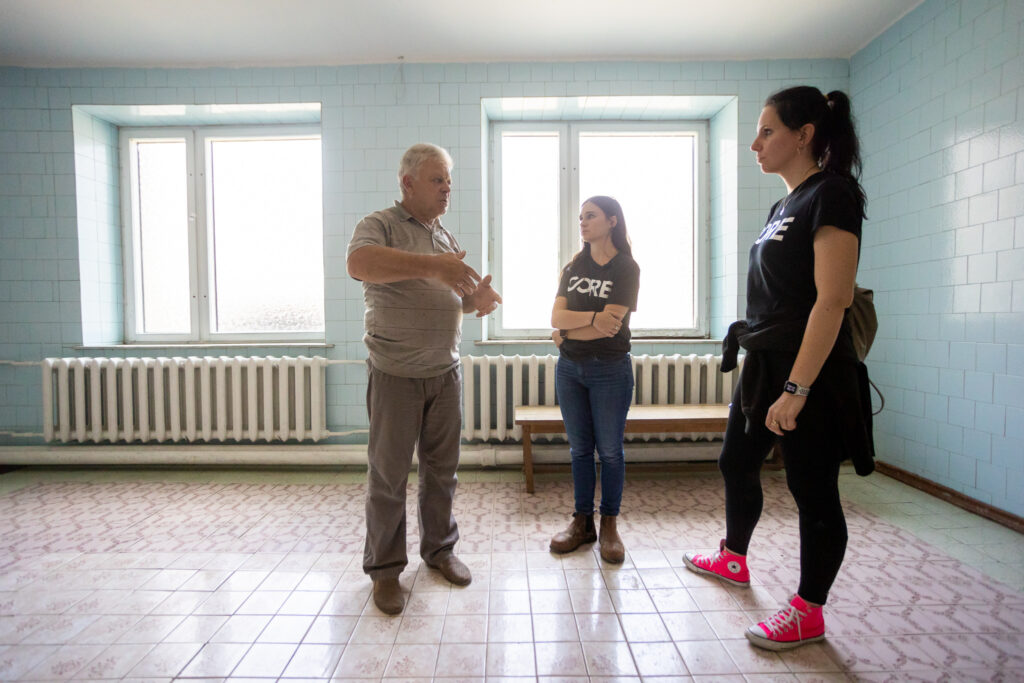HIGHLIGHTS
GET TO KNOW US
GET INVOLVED
MEDIA

REGIONS
California, Georgia, Chicago, North Carolina, New Orleans, Puerto Rico, Kentucky, Navajo Nation, Washington, D.C., Hawaii
INTERNATIONAL
Shelter Renovations Promise Comfort, Dignity for Displaced Ukrainians
Volodymyr, a soldier for the former Soviet Union, and his wife found safety over 1,000 kilometers away in a CORE-supported shelter in southern Ukraine. After travelling by car for nearly a week, reluctant to stop due to safety concerns, the couple settled in a sports hall-turned-shelter in Izmail, Ukraine. There, they were faced with a reality now shared by millions of displaced Ukrainians: finding comfort and security in a temporary home and unfamiliar town.
Volodymyr and his wife are just two of over 10 million Ukrainians as of September 2023 forced to uproot their lives in search of safety, shelter, and other basic resources. Below is his story.
Volodymyr and his wife fled their home in Mariupol less than a month after Russian forces invaded Ukraine. For weeks, the couple endured relentless shelling. Eventually, they lost power and access to water, forcing them to wait in hours-long lines at the town’s well to fill a mere couple of canisters. Food became scarce as they relied on reserves and a makeshift outdoor stove for daily meals.
Volodymyr recalls the many nights he, his wife, and other neighbors spent in a basement-turned-bomb shelter with no electricity, waiting anxiously for a moment of reprieve.
“All of us in the dark settled [in] our dwelling the best we could, made improvised beds where it was possible. … For a long time, these 20 days, every time a plane flew by, we shuddered not knowing whether bomb would hit us or not.”
Despite the persistent danger and uncertainty, the couple, like many other Ukrainians, struggled to part ways with the place they had called home for decades. “You know your native land always calls to you,” Volodymyr reflected. “Because Mariupol is our youth. Our children, our grandchildren grew up over there.”
The decision to leave became clear after a bomb exploded nearby, damaging Volodymyr’s car and leaving him with a concussion and partial hearing loss in one ear. They packed their belongings into the car and joined a long queue of people desperate to escape the danger as military tanks drove opposite them into the city. The couple drove for days, stopping for just one night at a population center in Zaporizhzhia.

Volodymyr showing CORE staff photos of the damage of Mariupol, Ukraine.
Nearly a week later, Volodymr and his wife settled in the port of Izmail, a small town located on the southernmost coast of Ukraine, over 1,100 kilometers from Mariupol. They were welcomed into the Palace of Sports, a large, multifunctional hall designated for travelling sports teams. Like hundreds of other spaces throughout the country, the sports hall had been converted into a shelter to host those who had lost their homes and/or access to other vital resources due to the conflict.
Those seeking refuge in Izmail were immediately met with care and attention. “To this day we accept people who come, we do our best to help with food, first of all, transport, if necessary, [and with] medicine. Our local doctors from our hospital attended all the places and left their contact details to be in touch [all the time],” said Ivan Lefterov, the villages’ headman.
Despite the relative peacefulness of the village and generosity of the shelter’s directors, the couple struggled to find solace.
“We feel safe, but still, if somewhere something like a door bangs, my wife will shudder. It’s that syndrome of fear of explosions that still remains, when the airplanes fly over, that residual fear, we still have it.”

Converted bedroom in the Palace of Sports before CORE’s intervention.
While the Palace of Sports and local organizations supported nearly 100 families’ immediate needs for shelter, food, and medical assistance, the space’s rapid conversion meant limited time to renovate rooms or ensure comfortable living situations. Single families were often crammed into one room, washrooms lacked adequate plumbing, and overcrowded, shared spaces made privacy difficult. Many struggled to adjust to their transition into temporary shelter living.
CORE, with local partners in Izmail, conducted a needs assessment at the Palace of Sports shelter. The team spoke with the director of the unit and families to understand what improvements could be made to provide guests with more dignified living conditions.
Through the provision of household appliances and plumbing supplies, CORE helped expand the hall’s capacity by renovating nine bedrooms and bathrooms. The team also added extra kitchen space and a proper washroom for families to do their laundry. These improvements help families regain autonomy and build resilience.

CORE staff speaks with Piotr Dimov, Director of the Palace of Sports, about the renovation.
Today, CORE continues to provide critical support to displaced individuals like Volodymyr and his wife in Ukraine, Poland, and Romania. Shelter remains a central focus of our emergency response, as millions of refugees and internally displaced people (IDPs) have fled their homes in search of safety and security. Since 2022, CORE’s shelter programs have reached more than 250,000 people.
In partnership with international and local organizations, CORE has supported dozens of collective centers, invincibility points, and accommodation centers. The teams have provided generators, portable charging stations, medication, heating systems, and other resources to shelters; led numerous shelter renovations; and operated a rental assistance program.
CORE teams in Ukraine, Poland, and Romania continue working alongside international and local partners, supporting the evolving needs of those most impacted by the devasting crisis.
Learn more about our work in response to the Ukrainian Humanitarian Crisis.
CORE’s work in Ukraine, Poland, Romania and worldwide are made possible by your generosity. Together, we can support those who need it most.
HIGHLIGHTS
GET TO KNOW US
GET INVOLVED
MEDIA

REGIONS
California, Georgia, Chicago, North Carolina, New Orleans, Puerto Rico, Kentucky, Navajo Nation, Washington, D.C., Hawaii
INTERNATIONAL

CORE is a charitable 501(c)(3) nonprofit organization. Federal tax ID: 27-1703237.
© 2024 | CORE – Community Organized Relief Effort | +1 (323) 934 4400
910 N Hill St Los Angeles, CA 90012